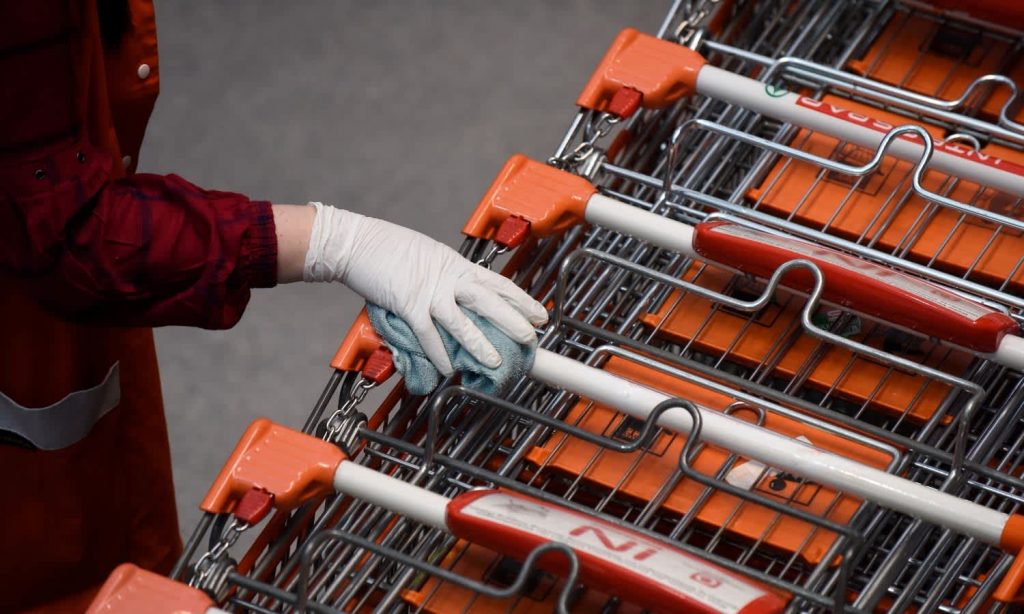Heading to the supermarket is one of the few reasons we’re allowed to leave the house these days — alongside exercise and work, for those who can’t work from home.
And, with Woolworths and Coles reducing home delivery to only those who are considered vulnerable, most of us have to venture to the shops to grab essential items.
So, the next time you head out, these hygiene protocols below could help minimise the risk of infection.
Don’t touch your face
Avoid touching your face at all costs. Infections are easily spread from touching surfaces and then touching your nose or eyes. And, as you’ll be touching hard surfaces like trolleys and baskets at the shop, you don’t want to transfer that to your face.
Supermarkets are making an effort wipe down trolley handles, conveyor belts and registers frequently but still be careful.
“You want to come home as quickly as possible, but if you have to access a toilet at the shopping centre go and wash your hands with soap and water immediately, or use a bit of alcohol-based hand sanitiser to clean and disinfect your hands,” Dr. Meru Sheel, an infectious disease epidemiologist from the Australian National University, told the ABC.
“Also minimise touching your face without cleaning your hands. That’s the biggest thing.”
Bring a shopping list
While perusing every aisle in the supermarket might be your usual habit, try not to dawdle during your shopping trip.
Instead, bring a shopping list with you so you can quickly find what you need and leave.
“I would recommend going back to the old-fashioned way that we used to do it, which was to write out a shopping list, know what you want to buy, go in, buy it, and leave,” said Queensland’s chief health officer, Jeannette Young.
Use wipes on the shopping trolley
If you’re feeling worried about using a trolley or basket, bring alcohol or antibacterial wipes from home and give them a quick wipe down before use. Then throw the used wipe straight in the bin! Alternatively, bring your own envirobags to fill up, and then take to the cash register.
Wear gloves
The next step up from using wipes would be wearing gloves to go shopping. And, if this is what makes you feel comfortable, do it!
Wearing gloves doesn’t negate the need for thorough handwashing after shopping, but it might give you a little more peace of mind.
Gloves might also work as a good reminder to not touch your face.
If you’re feeling unwell, don’t go shopping
It’s pretty simple, but a good reminder. Even if you’ve tested negative for COVID-19, or you simply have a cold, still stay at home.
Avoid the shops. Avoid passing whatever germs you may have onto others. Please stay home.
Post-shopping hygiene
According to Food Standards Australia New Zealand (FSANZ), there is no evidence that COVID-19 is spread through food.
“In a time of misinformation, the best advice to follow is the advice of trusted sources based on the most up to date scientific evidence,” Dr David Cox, Principal Research Scientist from CSIRO, said in a press release.
“That’s why we are urging Australians to follow the latest advice from FSANZ that COVID-19 is not transmitted by food.”
So, in the case of fresh fruits and veggies, simply give them a rinse under water before popping them in the fridge.
According to another CSIRO expert, the virus itself isn’t food-borne.
“The coronavirus is a respiratory virus, it’s not a food-borne virus. If you actually eat it, then it is not known to be transmitted,” Cathy Moir, a microbiologist who specialises in food safety, told the ABC.
Dietitian and nutritionist at Horticulture Innovation Australia, Jemma O’Hanlon, shows you how to handle fresh produce in line with FSANZ recommendations in the video below:
When it comes to other food or products that are housed in cardboard or plastic, it’s best to be a little more careful.
The virus that causes COVID-19 is called SARS-CoV-2 and a recent study found that this pesky virus can live on certain surfaces for hours or even days.
According to the study, the virus remained viable in the air for three whole hours, as reported by the ABC.
“On surfaces it was more stable on plastic and stainless steel, than it was on either copper or cardboard,” Suzannah Lyons wrote for the ABC.
“No viable SARS-CoV-2 was detected on the copper surface after four hours, and on the cardboard surface after 24 hours. Whereas it was still able to be detected up to 72 hours later on the stainless steel and plastic surfaces.”
So, when it comes to canned goods, feel free to give them a wipe over with a mixture of soap and water, or alcohol wipes, before packing them away. If you’re worried about cardboard, simply take the food out of the cardboard packaging and pop it straight in the bin.
And, continue to regularly clean all hard surfaces in your house like doorknobs, remote controls, taps and light switches.
“Soap, bleach, alcohol-based hand sanitisers, those alcohol sprays, these are really disruptive to the virus,” Stuart Tangye, an immunologist from the Garvan Institute of Medical Research, told the ABC.
“It doesn’t really stand a chance in the face of these sort of cleansers which is great for us, some viruses are very hard to get rid of, but this one is pretty flimsy in that context.”
The current health crisis is evolving rapidly. If you suspect you or a family member has coronavirus you should call (not visit) your GP or ring the national Coronavirus Health Information Hotline on 1800 020 080.
Read more stories from TheLatch— and follow us on Facebook.

